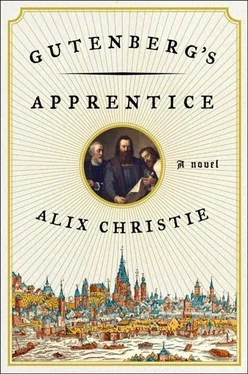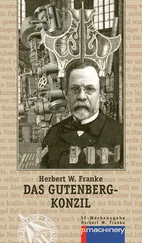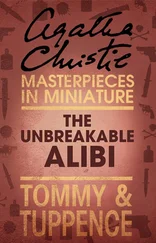The night advanced, and then the run was halfway done. The master stood by Neumeister, joking with the men as each page was peeled off. Peter stood up suddenly. “He never thinks of anybody but himself,” he said to Mentelin, who only nodded, eyes fixed on his lines.
“My father should be here,” he said to Gutenberg. Amazing, that a man could live for sixty years and still remain so ignorant. The master was all smiles; his breath was ripe. “Indeed,” he said. “A step or two ahead as always, Peter. I am in your debt.”
“I’ll hold you to it,” he responded wryly. A boy flew through the darkness to fetch Fust, and then Lorenz arrived with Keffer, pushing one of Gutenberg’s more precious private barrels. The wine was poured and shared around to all except the printers at the press. Fust came, rubbing the sleep out of his eyes, and when the last page settled on its pins, the master stopped the pressman with a hand. With a tilt of his gray head, he gestured toward his partner. Fust and Gutenberg put all four hands upon the bar.
“Heave-ho,” the master cried, and they both strained and with great effort dropped the platen.
“I never thought I’d see the day,” Fust murmured as the master peeled the page off, clearly stirred.
“Oh ye of little faith.” Gutenberg laughed.
He spun and took up glasses, handing them around. “Well, men,” he said, and raised his high. “We made it, thanks to you — and the protection of the Lord.” His eyes were burning just as bright as Peter’d ever seen them. He clanked his cup against each man’s in turn and stood for a long moment before Fust. “Let the Bohemians and Dutchmen eat our dust.”
“Amen,” Fust said. He was moved, and yet contained, it seemed to Peter.
The master turned to Peter. “There’s nothing like it on this earth.”
It was Mentelin who said they ought to raise a glass to Saint Bernard of Clairvaux, whose feast day had just passed. It was the order of Cistercians, after all, who had first harnessed God’s Creation for man’s use.
They raised their cups, and Peter wondered if he’d ever climb that mountain track to their great cloister above Eltville that the master had described some years before. The men were jabbering, the winecock flipping back and forth, and in that exultant clamor a strange and lonely feeling stole into his heart. He saw himself a solitary pilgrim, toiling all alone up the steep slope. To Gutenberg, they’d reached the summit: the dizzy height, the shocking newness of this Bible he had birthed. It was all his, the toil, the brilliance, and the long, exhausting haul. And everything that followed now for him would be a spreading, and a forking, from this monumental start.
Peter watched his flying hair, his twisted beard, the sparking in his gold-flecked eyes, and knew it was a moment Gutenberg could savor, and he should — though Peter felt a caving-in, surrounded by his fellows.
So much had come between the middle and the end. So little thought was spared for what might come thereafter. He watched his father nod farewell, slip out the door. His thoughts turned then to Anna, and to the psalter he had come to think of as his own, waiting patiently to be composed.
Hans was leaning on the wall with one knee up, foot braced behind him. He’d told them all that when the book was done, he’d pack his things and head back home to Strassburg. Though things were changed between them, Peter could not picture it — the workshop without Hans’s gnomish, precise presence. He was a loyal servant, and old-fashioned, he supposed.
The smith looked straight across the room at him and raised his cup. Peter touched a finger to his cap in answer. Hans straightened, bellowed “Oy!” The tumult stopped. He barked out, half embarrassed, “A toast then too, to Peter. Fancy hands kept us on track.”
The master added his hoarse voice to their loud cheers. “I give you Peter Schoeffer, men — the greatest printer who yet lives, save one!” There was a flash of warmth between the master and his long-ago apprentice, just before the roaring laughter.
Gutenberg had told him, not a week before, that he should never spurn that bread-and-butter work, that there were many ways to beat their plowshares into swords. He reveled in the war against the Turk, the master said: it was a matching of the wits, the wages of the devil beaten back by their own tempered, brilliant sword.
The master told them all that night that they’d have work in Mainz so long as he had breath. No danger, Ruppel cracked, of running out of that. Gutenberg just laughed. Not just such mighty works, he went on, but books small and large, in Latin and the common tongues, for princes and for paupers and the church. “That is”—he grinned—“so long as they keep off my back.” They had to hand him that: for all of Dietrich’s power, he had never learned about their secret scriptures.
The wine was put away; the folded sheets were hung to dry. As they closed up, the master put one hand on Peter’s back and said, “You choose your quires.”
It touched him, that he understood that need in him: to have the darkest, crispest ink, the cleanest bite, to gather for his copy the most perfect sheets that he could find.
“What about you?” the foreman asked. “I can easily assemble two.”
“Wait a while.” Detached, almost amused, the master lifted one scraggly eyebrow. “You never know what ballast you might have to drop.”
Anna oversaw the painting of the quires by that odd Austrian inside her father’s workshop. As the painter finished every sheet that Fust had set aside, she hung it carefully to dry, then marked it and refolded it. In this way, she said, she moved now through the scriptures as she pictured Peter doing all those months: verse by verse, chapter by chapter, book by book.
“I am amazed, I find,” she told him. Perhaps it was that fine illumination, married to his text, which helped her to accept it. His type was artificial, yes: but even so the words it made were still the same. Vain, to stand against it: printing would roll out and inundate the world regardless. “But maybe there can still be care in it.” She looked intently at him. She prayed each day that they might keep some contact with the old and treasured ways.
They moved the rest of the copies Fust required up to the Kaufhaus on the day before the convoy left for Frankfurt. Two dozen had been earmarked for his buyers, who had taken the whole book illuminated, rubricated, and then bound.
Fust and Gutenberg were bent above the benches in the pressroom, mumbling like witches: this score, then fourscore more, also spoken for by long-since-spent deposits. In all, eighty copies still remained to offer at the fair. Each double set of books weighed nearly a stone: what beasts indeed, thought Peter, looking at each massive pile. Twelve hundred eighty-two imprinted pages: from the doorway of the shop they looked like giant loaves.
A dozen paper copies went in Fust’s cart, and then another eight of vellum. Hard as he tried, Peter couldn’t read his father’s mood. He had not shared his thoughts since he’d received the full accounting. Yet all would work out right; Peter felt it in his bones. They’d sell them all and right the ship somehow. The joy of finishing, and love, did buoy him. All was in place to carry on: Mentelin would stay in Mainz, to finish off the psalter type, while Peter went to Frankfurt with the partners.
The copies Peter had selected for his father were exceeding fine. Fust did not take the time to notice. He simply nodded when the cart was loaded, and asked if Peter could help put them into storage. He had arranged to have the barrels carted to the Kaufhaus treasure room on the first landing. Both keys were needed to unlock that space, one held by Kraemer of the grocers’ guild, the other key by Jakob.
Читать дальше












